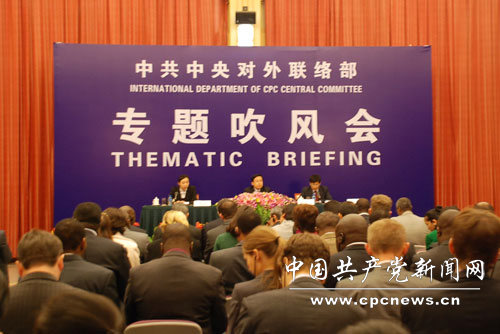
BEIJING, Oct, 24 -- Building cultural industry into a pillar of China's national economy has become an important goal of China's cultural development, according to a thematic briefing held here on Monday.
Wang Xiaohui, deputy head of the Publicity Department of the CPC Central Committee, made this remark to foreign diplomats in China during a briefing held to outline the essential points of the Sixth Plenary Session of the 17th CPC Central Committee. The session held from Oct. 15 to Oct. 18 adopted a guideline on boosting cultural reform and development.
Being a pillar industry means accounting for about five percent of the country's GDP, Wang explained. The total value-added output of the cultural industry across China in 2010 topped 1.1 trillion yuan (around 172.95 billion U.S. dollars), or about 2.78 percent of the country's GDP.
The Chinese cultural industry is showing vigorous vitality. The total box office of movies screened in China last year raked in 10 billion yuan (1.53 billion U.S. dollars),10 times that in 2002. The press publishing industry achieved a total output value of one trillion yuan in 2010, triple the amount of 2002.
However, problems still exist extensively, Wang admitted when answering a diplomat's question. China has witnessed a huge deficit in cultural trade with other countries, though it is now the second largest economy in the world and has reported trade surplus in many areas.
China is the world's largest producer of TV series, but the ratio of imported productions to exported ones is 15:1. The American TV drama series Friends, Sex and the City as well as Japanese and Korean dramas are often more popular among young Chinese than domestic ones.
Another problem, according to Wang, is that China's cultural companies are mostly small in scale and lack efficient management. The total revenue of China's publishing industry is smaller than a single publishing company in Germany, Wang cited an example.
China is pursuing a socialist path of cultural development, in which boosting public cultural services and speeding up the reform of the cultural industry are well-balanced, he said.
Cultural companies play a major role in China's cultural industry reform, including turning cultural institutions into independent companies and then developing them into competitive, large-scale corporations.
The major task for China's cultural industry is to deepen reform and bolster development, he concluded.
The thematic briefing is among a series of briefings held by the International Department of the CPC Central Committee for foreign diplomats in China to interpret major issues in building CPC and the development of the country. Enditem
|
